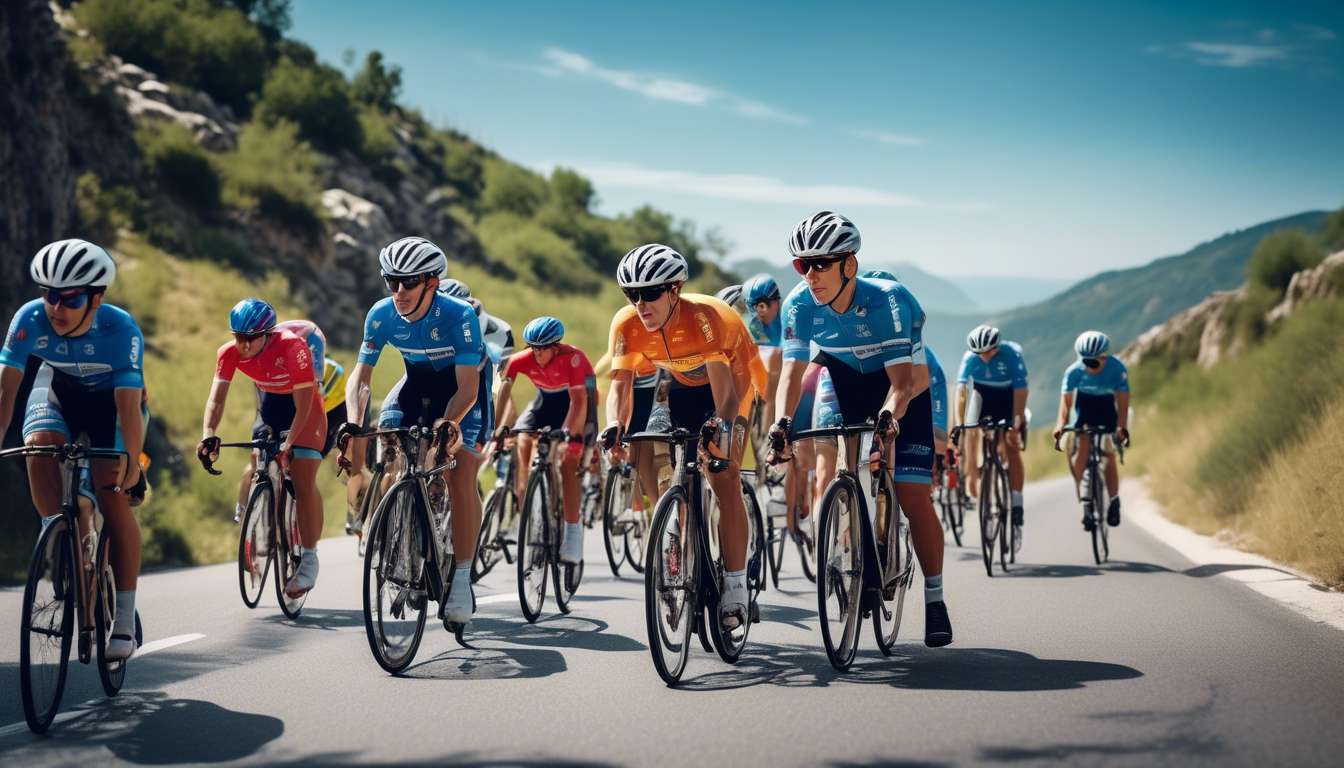As members of the cycling community, we often marvel at the seamless coordination and incredible stamina displayed by professional cycling teams. However, behind the exhilarating races and grueling climbs lies a complex and meticulously orchestrated operation that few truly understand.
In this article, we aim to pull back the curtain and delve into the inner workings of these elite teams. Together, we will explore the intricate roles each team member plays, from the star riders to the unsung heroes in support positions.
We’ll examine how strategies are crafted, adapted, and executed with precision, all while maintaining peak physical and mental performance.
Join us as we uncover the logistical feats involved in managing:
- Equipment
- Travel
- Nutrition
Each of these elements is integral to the success of the team.
By the end, we hope to deepen our appreciation for the dedication and strategic brilliance that propel professional cycling teams to victory.
Team Structure
A professional cycling team typically consists of several key roles, all working together to achieve success in races:
- Riders
- Team Manager
- Coaches
- Support Staff
We thrive on our strong team dynamics, which are crucial as we navigate the complexities of each race. As a cohesive unit, our strategy is meticulously planned and executed, ensuring everyone knows their role and how it contributes to our collective goal.
It’s not just about individual talent; it’s about how we synchronize our efforts to outpace the competition.
Roles and Responsibilities:
-
Team Manager:
- Orchestrates logistics
- Oversees the overall strategy
-
Coaches:
- Tailor training programs
- Maximize each rider’s potential
-
Support Staff:
- Ensure bikes are in top condition
- Optimize nutrition
- Manage logistics smoothly
We lean on each other, drawing strength from our shared commitment and camaraderie. Together, we push boundaries, united by our passion for cycling and our desire to belong to something greater.
Rider Roles
Riders in our team take on diverse roles, each contributing uniquely to our race strategy and overall success. Our team dynamics thrive on understanding and leveraging these roles.
Key Roles in Our Team:
-
Leader: Aims for victory and embodies our collective ambition.
-
Domestiques: The unsung heroes who provide invaluable support by:
- Setting the pace
- Shielding the leader from wind
- Fetching supplies to ensure our strategy stays intact
-
Sprinters: Focus on explosive speed, ready to seize opportunities in the final stretch.
-
Climbers: Excel on steep terrains, setting a relentless pace to break rivals.
-
Time Trialists: Use their steady power to drive us forward in individual efforts.
Team Dynamic: Each role, though distinct, weaves into a cohesive unit, ensuring everyone feels valued and essential.
Our strategy hinges on seamless collaboration, where every pedal stroke counts. We’re not just riding for individual glory; we’re riding for the team, creating a sense of belonging and shared purpose.
Race Preparation
Before the race, we meticulously plan every detail to ensure our team is fully prepared for any challenge.
Our preparation begins with:
- Understanding the course and weather conditions, which influences our strategy and equipment choices.
- Gathering as a team to discuss roles, where each member’s strengths contribute to our overall success. This is where team dynamics truly shine, as we align individual goals with team objectives.
We focus on developing a strategy that:
- Leverages our collective strengths.
- Involves our coaches studying past performances and current competitors.
- Crafts a race plan that maximizes our chances of victory.
We emphasize communication, ensuring every rider knows their role and how they can best support each other during the race.
Support extends beyond riders:
- Our mechanics ensure our bikes are in peak condition.
- Our nutritionists make sure we’re fueled with the right nutrition.
Together, this cohesive unit builds confidence, fostering a sense of belonging and unity as we approach race day.
In-Race Tactics
During the race, we constantly adapt our tactics to respond swiftly to unexpected developments and capitalize on emerging opportunities. Our team dynamics are built on trust and communication, enabling us to implement strategies that reflect both our strengths and the challenges posed by our competitors. We’re not just riders; we’re a cohesive unit that thrives on collaboration.
Our strategy often involves assigning specific roles, such as:
- Leading the breakaway
- Protecting our lead rider
- Chasing down rivals
These roles shift as the race progresses, requiring us to read the race in real time. Effective communication is crucial, allowing us to adjust our tactics and offer timely support to teammates, whether it’s providing a slipstream or offering encouragement.
We empower each other, recognizing that our collective success hinges on unity. By understanding our individual strengths and weaknesses, we create a supportive environment that fosters belonging. Together, we navigate the race’s complexities, always striving for victory.
Support Staff Functions
Every successful cycling team relies heavily on the expertise and dedication of our support staff, who work tirelessly behind the scenes to ensure we’re race-ready. They’re the unsung heroes, ensuring our team operates like a well-oiled machine. Their roles vary, but each is crucial in shaping our team dynamics and strategy.
Key Roles of Support Staff:
- Soigneurs: Provide massages and nutritional support to keep us in peak condition.
- Mechanics: Guarantee our bikes are in top form.
Our directors use their experience to devise race strategies, coordinating with coaches to analyze race routes and conditions. They foster a sense of unity and purpose, ensuring we all work towards shared goals.
The communication between us, the cyclists, and our support staff is seamless, allowing us to adapt quickly to any race-day challenges.
Together, we form a cohesive unit where every individual’s effort contributes to the team’s success. We thrive on this sense of belonging and shared purpose.
Equipment Management
Efficient Equipment Management
Efficient equipment management is crucial for ensuring that our bikes and gear are always race-ready and performing at their best. As a cycling team, we rely on each other and our equipment to achieve success. Our collective strength depends greatly on how well our equipment is maintained and prepared.
Team Dynamics and Roles
Team dynamics play a significant role, as everyone from riders to mechanics contributes to keeping everything in top form. Our mechanics are the unsung heroes, providing unwavering support by ensuring our bikes are perfectly tuned and ready for any challenge. They work tirelessly, fine-tuning each component to ensure optimal performance.
Strategizing and Preparation
We strategize meticulously by:
- Choosing the right gear for specific race conditions.
- Adjusting it to suit individual rider preferences.
Fostering Team Unity
This level of care and preparation fosters a sense of unity and belonging within our team. Together, we build confidence, knowing we can count on our equipment and each other to support our ambitious goals and shared victories.
Travel Logistics
Efficient travel logistics are vital for ensuring we arrive at races well-rested and ready to compete. Our team dynamics heavily rely on seamless coordination and planning when moving from one location to another. We strategically schedule flights, accommodations, and ground transport to minimize fatigue and maximize focus. This approach enables us to maintain our competitive edge and foster a sense of unity within our team.
Support staff play a crucial role in executing our travel strategy. They handle everything from booking flights to managing transportation of our equipment. By doing so, they allow us to concentrate on our performance and team cohesion. Their efforts ensure we’re always prepared, both mentally and physically, for the challenges ahead.
Being part of a team means trusting that everyone plays their part. Our shared experiences during travel help strengthen our bonds, reinforcing the camaraderie that is essential for our collective success on the road. Together, we move with purpose and precision.
Nutrition Planning
Proper nutrition planning is crucial for us to maintain peak performance and recovery throughout the demanding racing season. We’ve learned that our strategy for fueling our bodies directly impacts our success on the road.
Nutrition isn’t just about individual choices; it’s a vital part of our team dynamics. Every meal is meticulously planned to ensure it aligns with our training and racing goals, providing the right balance of carbohydrates, proteins, and fats.
Our nutritionists and support staff play a pivotal role in this process. They work closely with us, understanding our unique needs and adjusting our intake based on the day’s demands.
-
Before a race, we focus on energy-rich foods for stamina.
-
Recovery meals are tailored to repair and rebuild our muscles.
We’re not just a team on the road; our shared commitment to optimal nutrition fosters a sense of belonging and unity. Together, we strategize, support each other, and fuel our ambitions to reach the finish line stronger.
How are sponsorship deals negotiated and what impact do they have on a team’s operations?
When we negotiate sponsorship deals, we focus on aligning our team’s values with the sponsor’s goals.
These partnerships impact our operations by providing crucial financial support in several key areas:
- Equipment
- Travel
- Training
They also increase our visibility, which helps us:
- Attract more fans
- Secure future deals
Overall, sponsorship deals are essential for our team’s success, allowing us to compete at the highest level and achieve our goals together.
What criteria do teams use to select which races they will participate in each season?
When choosing races each season, we consider several key factors:
-
Team Strengths: We evaluate which races align with our strengths and where we can maximize our performance.
-
Race Profiles: Understanding the specific characteristics of each race helps in determining their suitability for our team.
-
Strategic Goals: We align our race choices with our long-term strategic objectives.
Additionally, we take into account the importance of races for:
- Sponsors
- Fans
- Overall team visibility
Our decisions aim to strike a balance between:
- Showcasing our abilities
- Achieving success
- Meeting the expectations of our supporters
By carefully considering these factors, we ensure that our race selections optimize performance and maximize exposure.
How do professional cycling teams handle language and cultural differences among international team members?
Open Communication and Mutual Respect
When it comes to language and cultural differences among our international team members, we prioritize open communication and mutual respect. We ensure that everyone feels valued and included by promoting understanding and embracing diversity.
Fostering a Supportive Environment
To create a supportive environment where everyone can thrive, we engage in various activities:
- Team-building activities
- Language lessons
- Cultural exchanges
Unified Team Dynamics
By celebrating our differences and working together, we create a strong, unified team that can overcome any challenge.
Conclusion
In conclusion, professional cycling teams operate as well-oiled machines, with each member playing a crucial role in the team’s success.
From the strategic race preparation to in-race tactics and support staff functions, every aspect is meticulously planned and executed.
The dedication to:
- equipment management
- travel logistics
- nutrition planning
ensures that the riders are in top form to compete at the highest level.
Overall, the teamwork and coordination within these teams are truly impressive.




